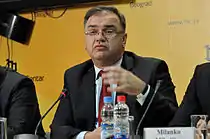Party of Democratic Progress
The Party of Democratic Progress (Serbian Cyrillic: Партија демократског прогреса (ПДП) РС / Serbian Latin: Partija demokratskog progresa (PDP) RS) is a centre-right Serb political party in Bosnia and Herzegovina founded on 26 September 1999. It is the third-largest party in Republika Srpska entity.[2][3]
Party of Democratic Progress Партија демократског прогреса РС Partija demokratskog progresa RS | |
|---|---|
 | |
| Leader | Branislav Borenović |
| Founder | Mladen Ivanić |
| Founded | 26 September 1999 |
| Headquarters | Banja Luka |
| Ideology | National conservatism Serb ethnic interests Economic liberalism Pro-Europeanism |
| Political position | Centre-right[1] |
| European affiliation | European People's Party (observer) |
| International affiliation | International Democrat Union (observer) |
| House of Representatives | 2 / 42
|
| House of Peoples | 0 / 15
|
| RS National Assembly | 8 / 83
|
| Website | |
| www | |
History

PDP was established in Banja Luka on 26 September 1999. During the founding assembly, Mladen Ivanić was elected as the president of the party, while Branko Dokić and Zoran Đerić were elected as vice presidents.[4] On 28 November 2015, Ivanić left the position of president after 16 years, after which Branislav Borenović became the new president of PDP.[5]

International Cooperation
The party is an observer member of the European People's Party (EPP) and International Democrat Union (IDU).
In terms of bilateral cooperation with other European parties, PDP maintains strong links with the Conservative Party (UK), Moderate Party (Sweden), Christian Democratic Union (Germany), SDKU (Slovakia), Austrian People's Party, New Democracy (Greece) and Democratic Party of Serbia from Serbia.
PDP also has good relations with Konrad Adenauer Foundation, Robert Schuman Institute and Democrat Youth Community of Europe.
Electoral results
Parliamentary elections
| Year | Popular vote | % of popular vote | # of seats | ± | Government |
|---|---|---|---|---|---|
| 2000 | 76,810 | 12.3% | 11 / 83 |
governmnent | |
| 2002 | 54,756 | 10.7% | 9 / 83 |
government | |
| 2006 | 38,681 | 6.86% | 8 / 83 |
opposition | |
| 2010 | 47,806 | 7.55% | 7 / 83 |
opposition | |
| 2014 | 48,845 | 7.38% | 7 / 83 |
opposition | |
| 2018 | 69,948 | 10.22% | 9 / 83 |
opposition |
Presidential elections
| Election year | # | Candidate | Votes | % | Note | Elected? |
|---|---|---|---|---|---|---|
| 2002 | Desnica Radivojević | 41,667 | 35.9% | — | No | |
| 2006 | Mladen Bosić | 130,824 | 24.2% | Support | No | |
| 2010 | Mladen Ivanić | 285,951 | 47.31% | — | No | |
| 2014 | Mladen Ivanić | 318,196 | 48.71% | — | Yes | |
| 2018 | Mladen Ivanić | 292,065 | 42.74% | — | No |
| Election year | # | Candidate | Votes | % | Note | Elected? |
|---|---|---|---|---|---|---|
| 2000 | Momčilo Tepić | 54,392 | 8.64% | — | No | |
| 2002 | Dragan Mikerević | 39,978 | 7.83% | — | No | |
| 2006 | Slobodan Nagradić | 19,623 | 3.54% | — | No | |
| 2007 | Mladen Ivanić | 69,522 | 16.91% | — | No | |
| 2010 | Ognjen Tadić | 227,239 | 35.92% | Support | No | |
| 2014 | Ognjen Tadić | 296,021 | 44.28% | Support | No | |
| 2018 | Vukota Govedarica | 284,140 | 41.81% | Support | No |
Positions held
Major positions held by Party of Democratic Progress members:
| Member of the Presidency of Bosnia and Herzegovina | Years |
|---|---|
| Mladen Ivanić | 2014–2018 |
| Chairman of the Council of Ministers of Bosnia and Herzegovina | Years |
| Dragan Mikerević | 2002 |
| Prime Minister of Republika Srpska | Years |
| Mladen Ivanić | 2001–2003 |
| Dragan Mikerević | 2003–2005 |
| Mayor of Banja Luka | Years |
| Draško Stanivuković | 2020– |
References
- "Serb, Bosniak nationalists, Croat center-left win Bosnia Herzegovina election". EFE. 8 October 2018.
- Bakke, Elisabeth (18 February 2010). "Party Systems since 1989". In Ramet, Sabrina P. (ed.). Central and Southeast European Politics since 1989. Cambridge University Press. p. 79.
- Nordsieck, Wolfram (2018). "Bosnia-Herzegovina". Parties and Elections in Europe. Retrieved 11 October 2018.
- Glas Javnosti (Serbian)
- "Borenović izabran za novog predsjednika PDP-a, cilj preuzimanje Vlade RS" (in Bosnian). Klix.ba. 28 November 2015. Retrieved 28 November 2015.